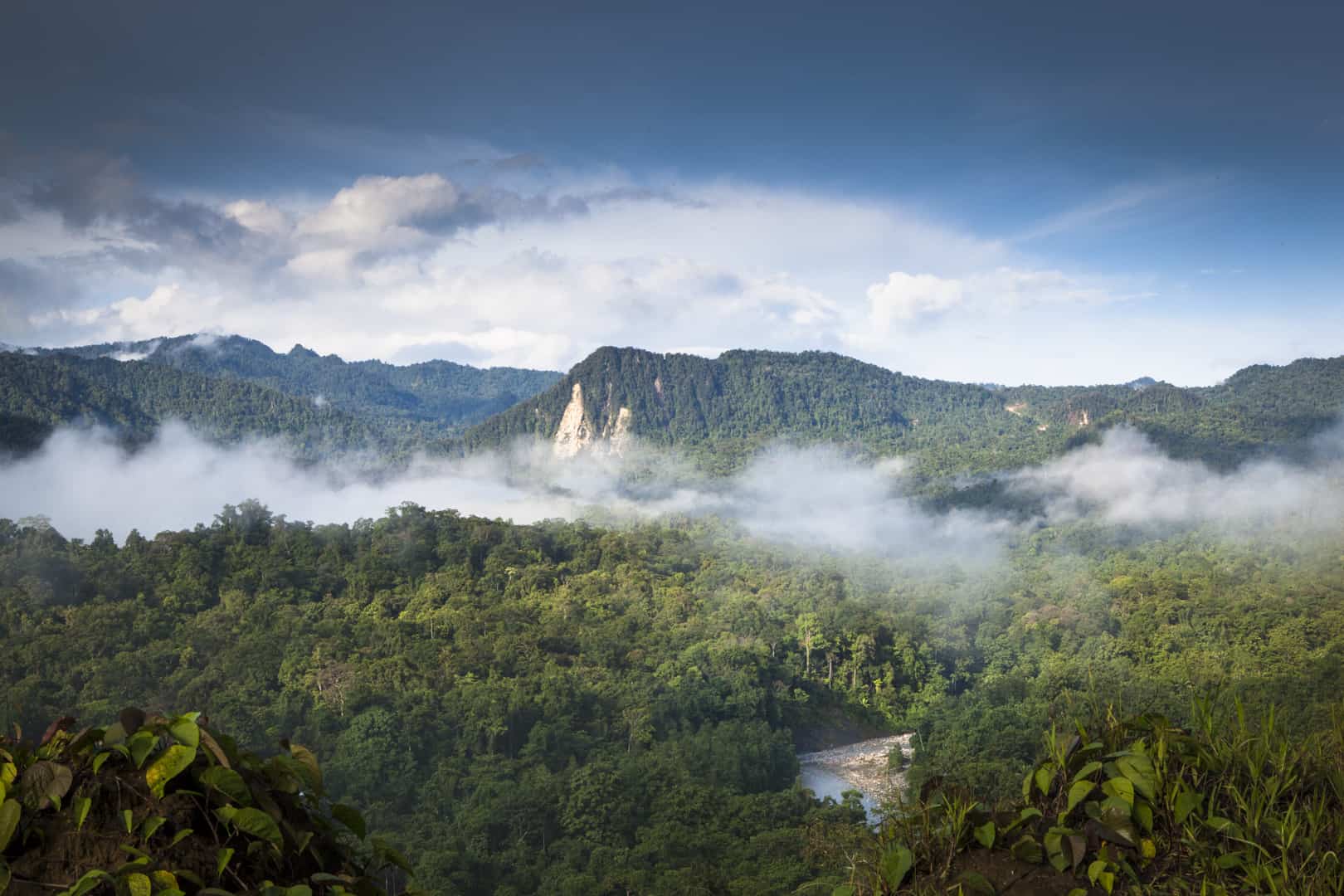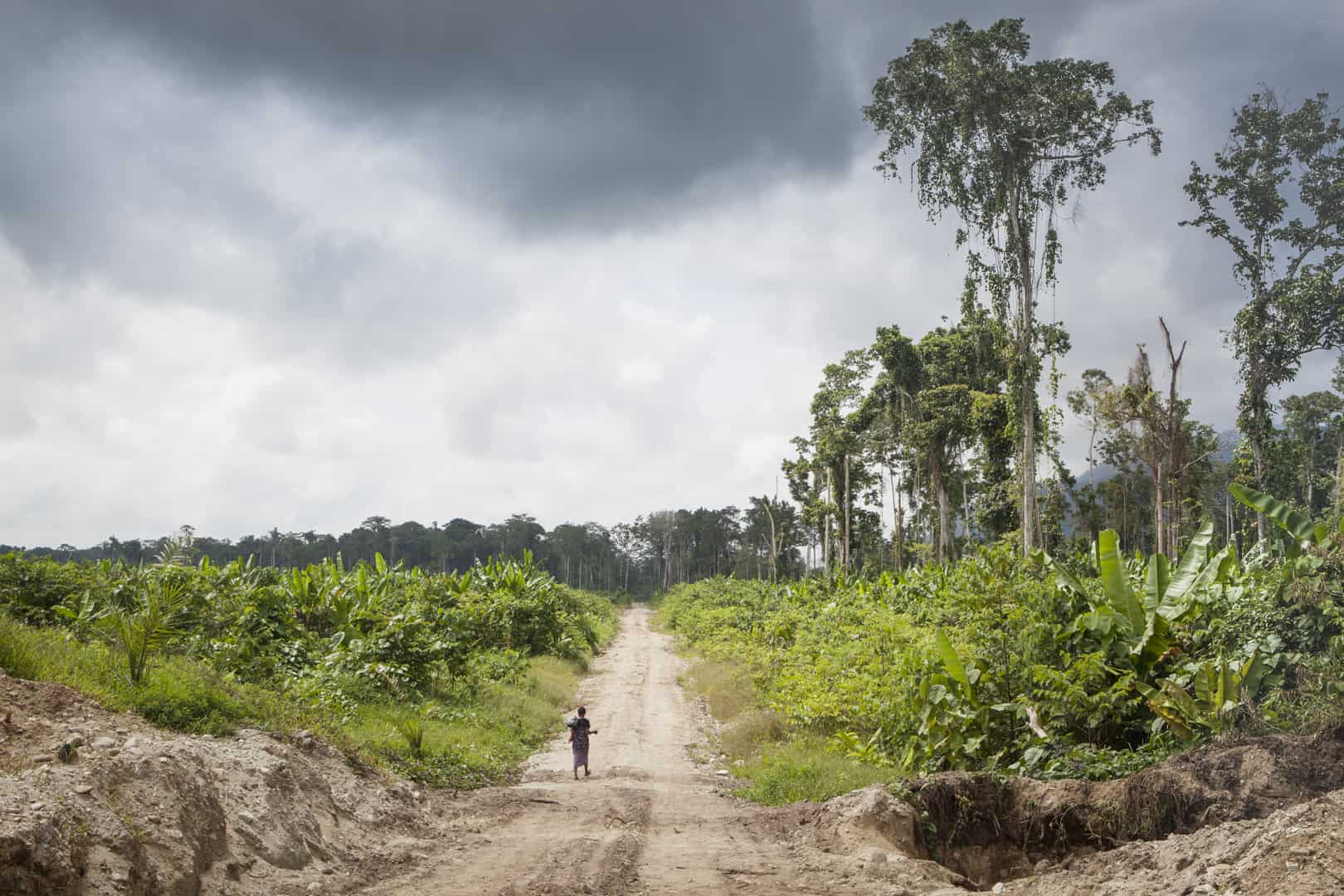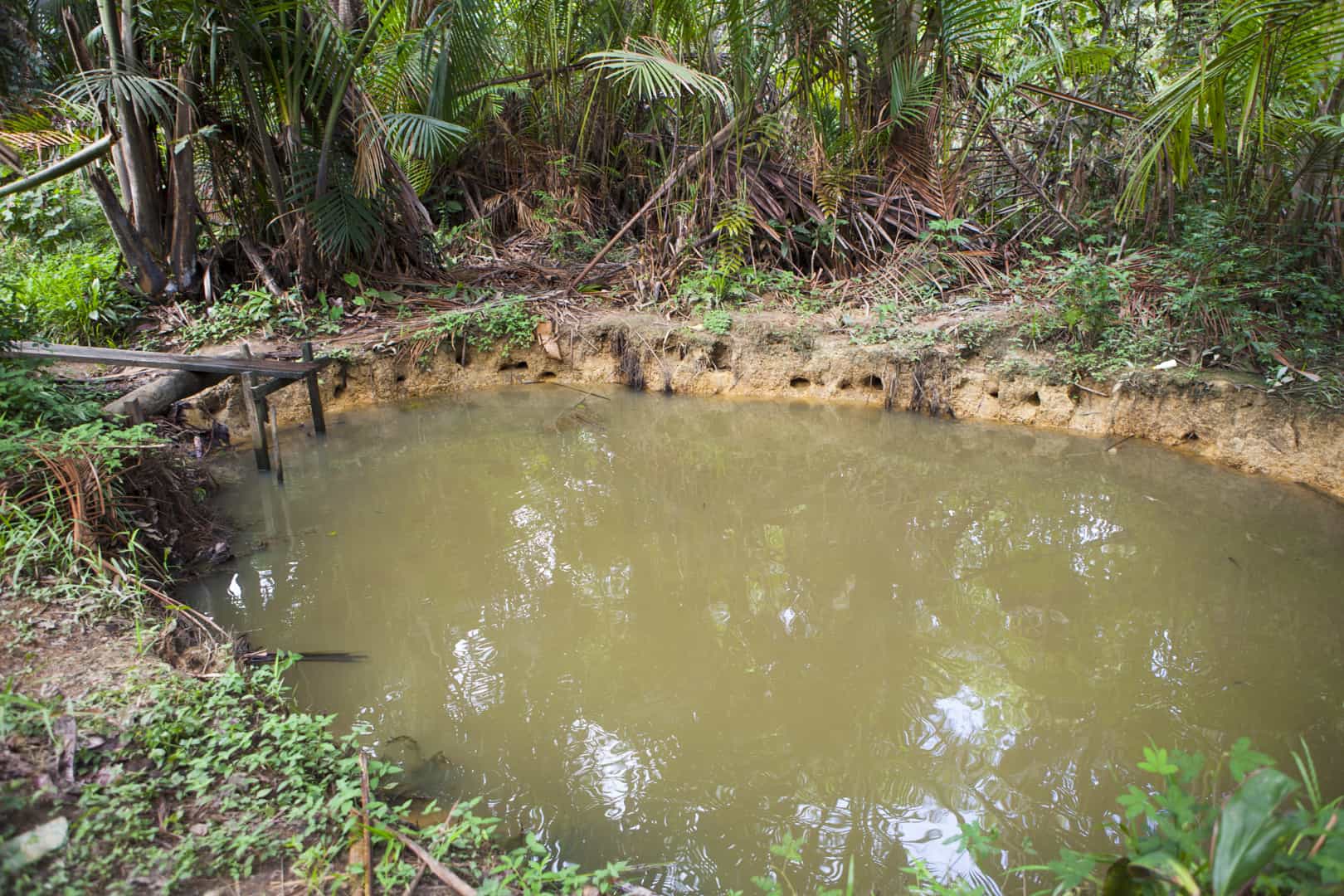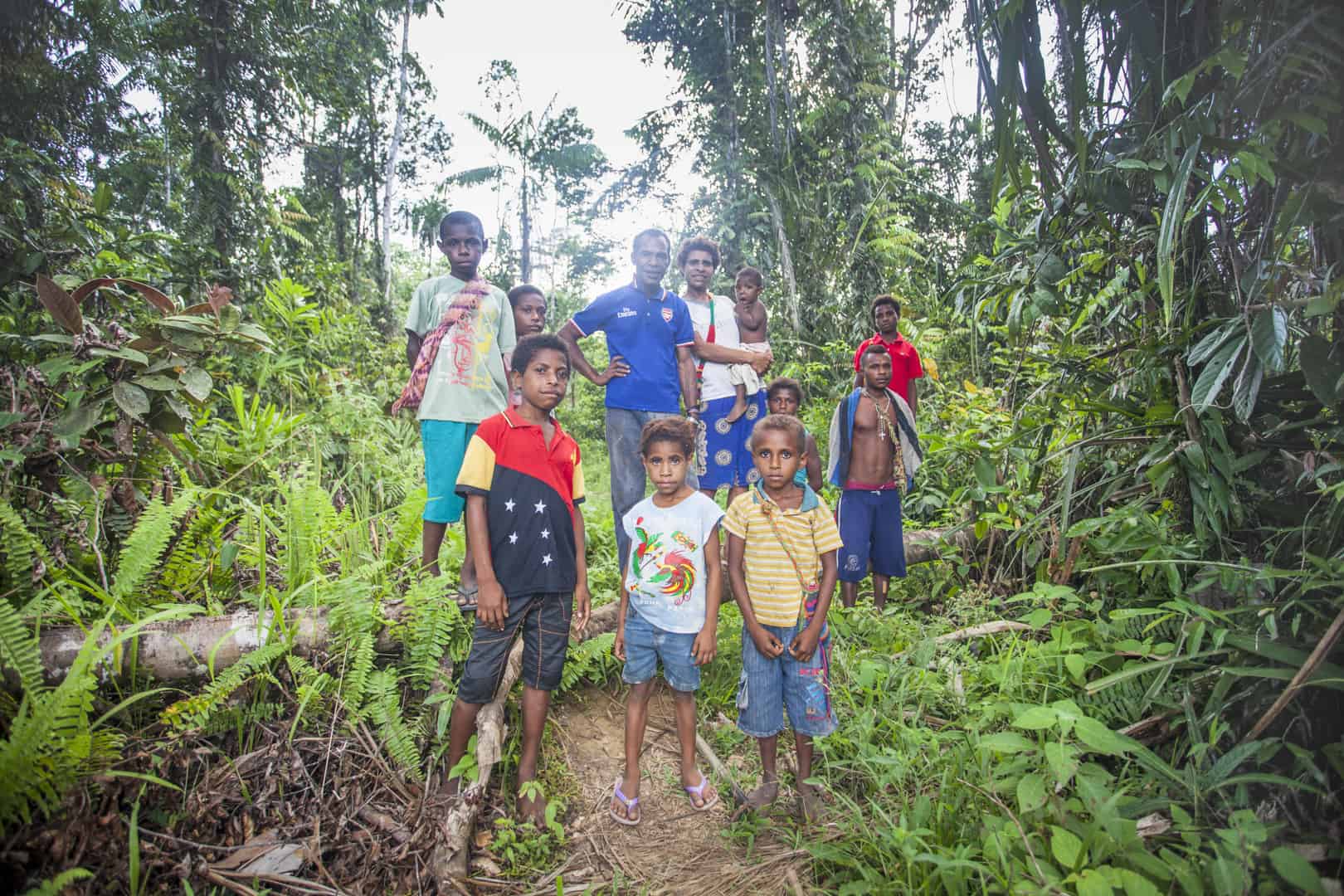"As thunder rumbled across the valley, the children assured me it wasn’t going to rain. “Oh, that noise? It is the big trees being loaded onto the ships.” A few minutes later we met several naked children playing in front of enormous felled trees. Their inheritance, now neatly stacked and labeled for export. As the rampant deforestation of Papua New Guinea for palm oil continues, it is putting their future - and the climate - at risk." Sarah Fretwell
"We only see our land as an inheritance…[that] we pass on to the next [generation]. We don’t have bank accounts, here the only thing we leave behind is our land. That is why it is important to protect this."
Before I stepped into the small garden that had been carved out at the edge of the tropical jungle, “Ruth” put her hand up to stop me. She needed to ask the ancestors of the land for permission to bring me there. Papuans hold special respect for their ancestors, so permission was necessary. They also hold special respect for future generations, which “Ruth” simply referred to as “the next.”
“Ruth” showed me native plants she is working to preserve before they go extinct, victims of deforestation. Eventually, I broached the idea of me going further into the jungle to see what was really going on. She looked me squarely in the eyes, “Just don’t let them see you taking photos or asking questions. They [private armed thugs hired by a corrupt local politician] can do whatever they want if they find you.”
The forests of the Island of New Guinea comprise one of three of the last remaining “lungs” of the planet. They contain the largest swaths of entact rainforest on the planet and they store higher amounts of carbon than other forests. Keeping these forests intacted is critical to help mitigate climate change because they sequester carbon and help reduce greenhouse gas in the atmosphere. Large swaths are being wiped out to be sold as cheap timber on the world market and the land is cleared for industrial agriculture – much of it for palm oil.
Even with many warnings, the risks seemed worth the adventure because the health of the planet – and everyone on it – is intrinsically linked to this island. Its forests contain seven percent of the world’s biodiversity and the ocean touts the highest marine biodiversity on the planet. It is an important place that is changing forever but at unknown long-term costs to locals and the world. I wanted to understand what was happening firsthand.

Near the timber staging area where the logs are brought down from the rainforest to be loaded on ships and sold overseas to be made into furniture and other goods, “Ruth”, the local Greenpeace activist, tips me off to a conflict going on in the remaining primary jungle above her town. And I set off in search of a woman named “Francis” whose clan (family) land is being illegally logged.

As we drive up the only road for hundreds of miles, they tell me just a few years ago the only way to get here was on foot. Now a Malaysian logging company has built a “free” road on private land to cut high-value timber in the area. Local clans have struck deals with the company and are paid for the value of the timber, but not use of the land. In most areas after the primary rainforest is logged and then plantations and mining operations come into the area. With little environmental oversight, this pristine rainforest is being wiped out – forever. “White Stone” (the white triangle on the hillside) is the highest homestead encampment in the area and the end of the road.
As I talk with people it becomes apparent the “Wild West” of development in Papua New Guinea is full of land grabs, logging, mining, natural resource extraction, violence, government indiscretion, multinational corporations, and the oppression of women. And these indiscretions now often come at the hands of their own family.

On this logging road outside of Vanimo, Papua New Guinea the lower portions (originally primary rainforest) are now logged, with plantations of cacao and palm oil moving in. The local politician for the area struck a deal with the palm oil company, but the community has seen none of the profits. Community water sources are now polluted with pesticides. Families are deeply divided over the best use of the land and resources.

When I show up to their remote jungle village unannounced, several people eyes light up when they heard I am from California. “The Governator!”, they say back to me. I am surprised to learn they are apparently huge Arnold Schwarzenegger fans. From that moment on I am “in.” As I investigate further, locals confirm what I had been told, the palm oil company was removing the high-value timber clear cutting the primary jungle and building the first road in the area without full permission of the clan (family) or proper compensation to the community.

"Our relationship with nature is a part of our spiritual world. It's a part of our being, it's a part of our life as Melanesians. It's a part of our culture, and we are getting pushed into a situation where we are losing the connection [that] makes us a people."
“Francis’s” mother takes me to see where they are illegally clearing her family’s land. As an excavator works to clear away primary rainforest to build the road, other people unhappy she is there with a foreigner who has a camera come to have words with us. I have no idea what is said, but intimidation is in the air. She defiantly steps in front of the camera and let’s me take a picture – we both know she has every right to be here. Her family is protesting the building of the road without their consent or receipt of any payment, but it looks like not everyone agrees.

In the village shouts rang out “weli meri Sarah, weli meri Sarah” something along the lines of “white girl Sarah, white girl Sarah” with curiosity to meet me. Apparently, people are hearing about me and learning my name before I ever even arrive on their land. As the children excitedly stroke my arm and remove my ponytail so they can run their fingers through my sun bleached hair, I strongly empathized with the celebrity animal at a zoo. I am, after all, a rare and exotic creature to many of them. “Where are you going?” and “What are you doing?” are frequent questions. I reply with a smile in my limited Tok Pisin, “Mi kam longwe. Mi laik tekim plenti photo.” I have come a long way and I would like to take a lot of photographs.
Residents are absolutely delighted with my attempts to speak the local dialect and a few little girls I meet are determined to teach me the entire language as they paraded me around to their favorite swimming hole. It is hopeless to try to keep a low profile. It seems in village life everyone knows everything that is going on around them. But in the times where it matters, villagers offer me shelter, hide me in the back of pickup truck beds, and we travel together under the cover of night to the sound of cicadas echoing across the valley and thousands of fireflies lighting up the night sky overhead.
What I am experiencing in Papua New Guinea is the conflict of globalization as ancient land and communities are being put under immense pressure from the consumption demands of modern life. Families are divided over choosing a “better future” by “leasing” large swaths of intact primary rainforest to industries such as logging, palm oil, and mining below market value or face economic instability as the world develops around them. In the “Wild West” economics of these developing regions, the government is either unsure how to manage the rampant growth, or simply unable to manage it. International conglomerates, doing business as usual, are profiting at the expense of tribes and the environment.

The Papua New Guinea government is brokering ninety-nine-year leases with corporations (most foreign) to develop the land. No one seems to fully grasp the long term implications of what this means in a culture where your family inheritance is your land. Land boundaries are being erased, the people making the agreements now will die before the lease expires, and many claim poor records are being kept about the terms of these deals. If families can take back their land most of them will not have the financial resources necessary to take over an industrial scale palm oil operation or mine. The truth is, tribes are not truly benefiting from the leasing of their land, and no one seems to care as long as there is a profit to be made. Compensation to landowners in no way reflects the true value of the land, the impact these industries will have on the community, their water sources, the environment, and the planet.

A local family I meet sold a portion of their land (once primary rainforest) to be clear cut for a palm oil plantation. As the entire family walks me over to see their land, the father says he is very happy about the deal he made and was paid for. First we visit their ancestral land that is still untouched. And then cross the logging road to the land that has been clear cut for a palm oil lease.


The problem is that often locals are paid far below market value for their land. In one instance on the Indonesian government side of the island, a klan was paid only US$.65 cents per hectare for 14.2 square kilometers of forest land. In other instances, although land is passed down matrilineality, male family members are making deals without the entire family’s approval. While the land has not been released by all of the stakeholders, companies move forward with development.

Bewani Oil Palm touts “sustainable plantation practices” and Corporate Social Responsibility on their website, but at the time of my visit the community has seen little return. As I visit the pesticide-polluted well they can no longer drink from, I recall being told how a community member (now an elected official) brokered a deal with Bewani Oil Palm when the community mistakenly gave him the power of attorney to negotiate with investors on their behalf. The landowners have lost all rights to comment on their land, the land had been clear felled, and the community has not received a single Toya (Papua New Guinea dollar) for the land going under the 99 year lease. Now the money has been squandered by the elected official, he has used private armed men to threaten landowners who oppose him.

With few other income options and a desire to provide a better life for “the next,” many families have no recourse for the deals that have been struck with the government and multinational corporations. These deals continue to take place today with little way to measure the true market value for their resources, timber, or the true cost to future generations – and the planet.
I am only one person what can I do about this? In our global world everything we buy impacts other people and the planet. Educate yourself about the products you buy and the business practices you support. If this article upset you, there is a lot you can do. Business as usual will shift, when you start voting for what you want more of in the world with your dollars.
Learn More:
The island of New Guinea – https://en.wikipedia.org/wiki/New_Guinea
Calculate your carbon footprint in 2 clicks – https://www.ecosphere.plus/carbon-footprint-calculator/
Educate yourself about palm oil – https://thebreakthrough.org/index.php/programs/conservation-and-development/can-palm-oil-deforestation-be-stopped
HealthLine – Is Palm Oil Good, or Bad for your Health?
SuperHuman Coach – The Pros and Cons of Palm Oil.
The Rainforest Alliance [About 6.5 million farmers—including more than three million smallholders—rely on oil palm cultivation for their livelihoods. The Rainforest Alliance has begun to transform industry practices in Colombia, Costa Rica, Guatemala, Honduras, Indonesia, and Papua New Guinea.] – Rainforest Alliance palm oil certification program
Learn the simple science of Global Warming, and learn how your decisions as an individual and consumer are a key to the solution – http://www.globalwarmingprimer.com/primer/
